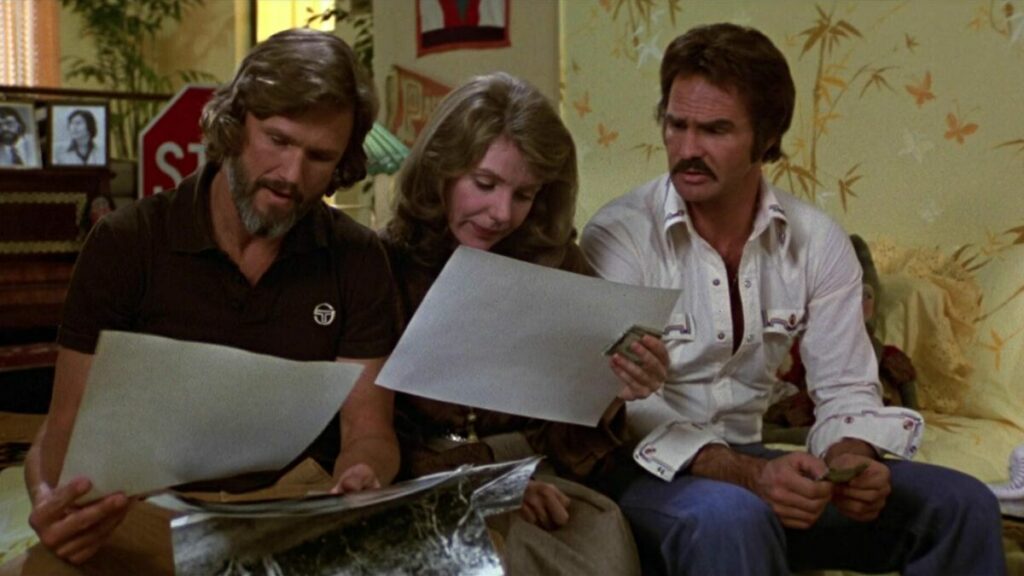
Semi-Tough (1977) follows Billy Clyde Puckett (Burt Reynolds) and “Shake” Tiller (Kris Kristofferson) as they play a Super Bowl season for team owner “Big Ed” (Robert Preston) and navigate a love triangle with his daughter Barbara Jane (Jill Clayburgh), their roommate and best friend. Semi-Tough combines the narrative tropes of the sports movie with the romantic comedy in order to dissect and deconstruct masculine ideologies, posturing, and institutions. Directed by Michael Ritchie, Semi-Tough is an anti-sports sports movie that trades on the charm and charisma of its stars in the same fashion as the screwball comedies of the thirties.
Michael Ritchie is a truly underrated director. His greatest asset is his ability to cross-pollinate genres without ever compromising the tone or narrative coherence of his films. Semi-Tough manages to be a classic example of the love triangle while seamlessly incorporating a scathing satire of EST and a plethora of physical comedy gags. Ritchie trusts his actors to inhabit these disparate genre spaces convincingly enough to sell this varied film as a wholly inclusive dramatic world. Semi-Tough is a world where Burt Reynolds would have to compete with Kristofferson for a girl but also a world where Robert Preston, in a scene stealing performance, would crawl around on his office floor for five straight minutes.
While Ritchie’s direction emphasizes and utilizes the performances of his actors in order to unify diverse genre mechanics, his eye as a filmmaker is fixed on the disassembly and scrutinization of late-seventies masculinity. Reynolds and Kristofferson, as signifiers, represent the then new notion of the “sensitive tough guy” which is deliberately juxtaposed with their occupation as football players, the manliest of the men. The biggest obstacle to either Reynolds’ or Kristofferson’s character is to achieve what they want while still adhering to the expectations of idealized masculinity. Kristofferson’s belief in the phony EST knock off B.E.A.T. is his way of reconciling a new age of masculine sensitivity with football’s he-man persona while Reynolds quite literally fakes it till he makes it.
At the center of all of this is Jill Clayburgh as the best friend, the object of desire, and the cherished only daughter. Unsurprisingly, in a film about men and their manly machinations designed to thwart each other’s claims on a woman, Clayburgh is left playing an underdeveloped character. To her credit (and Ritchie’s as a director), Barbara Jane exists in Semi-Tough as more realized person than either “Big Ed” or “Shake”. At every opportunity Clayburgh manages to subtly suggest a life for Jane beyond what is glimpsed in the film, giving the illusion that she is more real than any of her male co-stars, including the romantic lead Burt Reynolds. The success of Clayburgh as an actor in Semi-Tough works to further subvert the masculine ideologies that are already under attack in the film.
In an inspired choice, the actual demonstration of male virility that is the football game is relegated to even less screen time than the women get in Semi-Tough. When Ritchie does show a game it is in a quick montage cut to a Gene Autry song that intentionally infantilizes the players and the game by recalling children’s television programs and sporting events from the fifties when Reynolds and Kristofferson were kids. Clayburgh’s Barbara Jane feels more real because she is an adult while Billy Clyde and “Shake” are merely children playing at being men.
In this way Semi-Tough is to football as a masculinist institution as Smile (1975) is to beauty pageants and misogynist notions of femininity. Ritchie’s pre-occupation with the gender binary as a social and political institution makes his comedies in the seventies more relevant now than ever, even if some of the jokes and attitudes are dated. Both films are entertainments in the classic Hollywood sense, but each also doubles as a societal critique that is both insightful and scathing; making them essential viewing.
